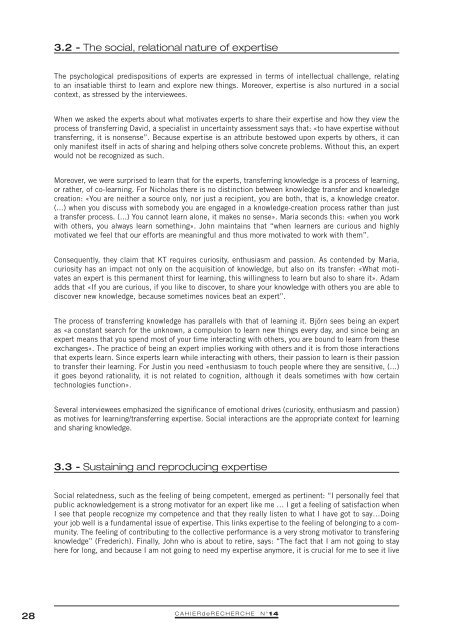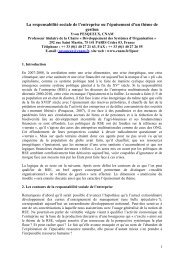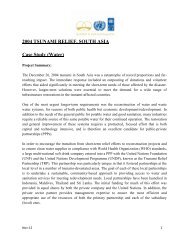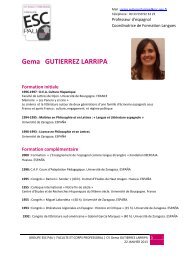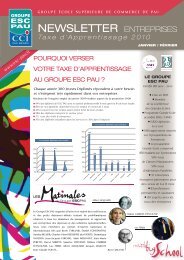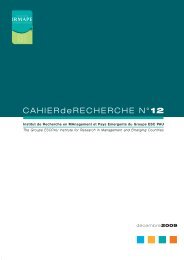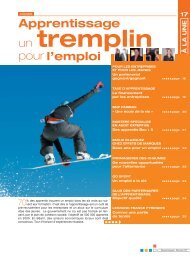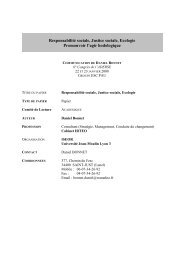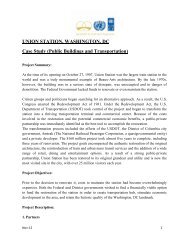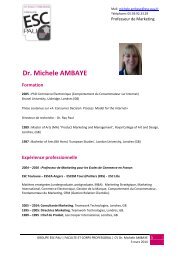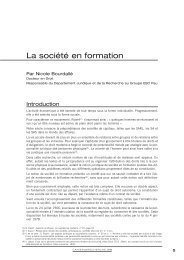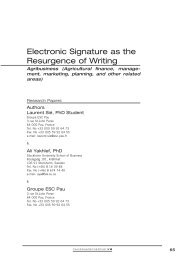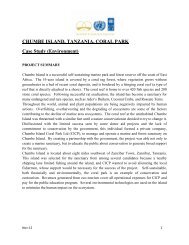The empirical material is elicited from the following 28 geo-scientists interviewed at the company’s geosciencesdivision:• 5 experts with over 20 years’ experience;• 2 experts retired but still working on research projects;• 8 specialists (senior researchers, future experts, with over 15 years of experience);• 3 technical managers who manage technical teams with experts and specialists• 10 less experienced scientists with less than 5 years’ experience, working closely with experts.The informants are of 12 different nationalities: Algerian, Angolan, Dutch, British, French,Iranian, Israeli, Lebanese, Nigerian, Norwegian, Russian, and Spanish. Interview time rangedfrom 50 to 120 minutes (70 minutes on average). During these interactions, we asked questionson how they <strong>de</strong>fine and relate to their field of expertise, how and what motivates themto transfer their expertise. In or<strong>de</strong>r to know about the perspective of the novices and technicalmanagers, our questions to them revolved round how they experience the transfer process andwhat are the requirements for an effective knowledge transfer process. In or<strong>de</strong>r to protect thei<strong>de</strong>ntity of the interviewees, we have used fictive names. All the assembled material was sentto the company to ensure that our interpretations are consistent with their own perceptions oftheir practices and experiences.3.1 - Intrinsic nature of expertiseThe experts consi<strong>de</strong>r their work as inherently interesting, emphasizing the importance of curiosity andpassion for exploration as prerequisites for carrying out their tasks. Nicholas summarizes his un<strong>de</strong>rstandingof his role: «when you are an expert, in general it is because you invested many years in your work,and that because you enjoy it”. Another expert, Adam <strong>de</strong>scribes why he has chosen to be a geo-scientistin the following way: «I had this ‘sweet’ taste for discovery and exploration: I have always wanted to findthe solutions that others cannot ... I just like discovering». One is motivated in his work as long as theyare curious about their field of study. Fre<strong>de</strong>rich seconds this view: «The willingness to exert one’s self andthe curiosity towards one’s job are hallmarks of what it is to be an expert. Of course, we should not forgetsocial recognition and job satisfaction as further factors that <strong>de</strong>termined my <strong>de</strong>cision». Vincent <strong>de</strong>finesjob satisfaction in terms of satisfaction of his curiosity to learn: «I take pleasure in learning in or<strong>de</strong>r tosatisfy my curiosity; if I cannot satisfy my curiosity to learn I am not happy with doing my job». John whois a geo-statistician and what motivates him in his work is «curiosity to learn, to un<strong>de</strong>rstand and to think,it is an inner drive that sustains [his] thirst for learning». Kad<strong>de</strong>r adds that «when I was a kid I liked todisassemble my toys because I was so curious about what was insi<strong>de</strong> them and how they worked ...thisis why I became an engineer». John said more or less the same thing: «my wife is often complainingthat I cannot take my mind off my work, because even when we are on holiday, such as when climbinga mountain, I would stop and examine the stones and rocks that look unfamiliar to me». For Patrick, aformer geophysical research manager, «the i<strong>de</strong>al expert has more than curiosity. S/he also needs to bepassionate about the objects of their knowledge. Because this form of knowledge can only be learned bydoing and through many years, one needs curiosity, enthusiasm, passion and humor». John adds that: «atrue geologist has a certain relation, a physical, but not a sexual one, with stones: s/he would touch it,feel it, smell it and sometimes lick it in or<strong>de</strong>r to come closer to it».In this sense, expertise is related to the emotional commitment experts invest in their knowledge. They regar<strong>de</strong>nthusiasm, curiosity and passion as intrinsically-boun<strong>de</strong>d elements of becoming expert. Becomingan expert is a lengthy and painstaking process which cannot be achieved without emotional investmentand passion.CAHIER<strong>de</strong>RECHERCHE N°1427
3.2 - The social, relational nature of expertiseThe psychological predispositions of experts are expressed in terms of intellectual challenge, relatingto an insatiable thirst to learn and explore new things. Moreover, expertise is also nurtured in a socialcontext, as stressed by the interviewees.When we asked the experts about what motivates experts to share their expertise and how they view theprocess of transferring David, a specialist in uncertainty assessment says that: «to have expertise withouttransferring, it is nonsense”. Because expertise is an attribute bestowed upon experts by others, it canonly manifest itself in acts of sharing and helping others solve concrete problems. Without this, an expertwould not be recognized as such.Moreover, we were surprised to learn that for the experts, transferring knowledge is a process of learning,or rather, of co-learning. For Nicholas there is no distinction between knowledge transfer and knowledgecreation: «You are neither a source only, nor just a recipient, you are both, that is, a knowledge creator.(...) when you discuss with somebody you are engaged in a knowledge-creation process rather than justa transfer process. (...) You cannot learn alone, it makes no sense». Maria seconds this: «when you workwith others, you always learn something». John maintains that “when learners are curious and highlymotivated we feel that our efforts are meaningful and thus more motivated to work with them”.Consequently, they claim that KT requires curiosity, enthusiasm and passion. As conten<strong>de</strong>d by Maria,curiosity has an impact not only on the acquisition of knowledge, but also on its transfer: «What motivatesan expert is this permanent thirst for learning, this willingness to learn but also to share it». Adamadds that «If you are curious, if you like to discover, to share your knowledge with others you are able todiscover new knowledge, because sometimes novices beat an expert”.The process of transferring knowledge has parallels with that of learning it. Björn sees being an expertas «a constant search for the unknown, a compulsion to learn new things every day, and since being anexpert means that you spend most of your time interacting with others, you are bound to learn from theseexchanges». The practice of being an expert implies working with others and it is from those interactionsthat experts learn. Since experts learn while interacting with others, their passion to learn is their passionto transfer their learning. For Justin you need «enthusiasm to touch people where they are sensitive, (...)it goes beyond rationality, it is not related to cognition, although it <strong>de</strong>als sometimes with how certaintechnologies function».Several interviewees emphasized the significance of emotional drives (curiosity, enthusiasm and passion)as motives for learning/transferring expertise. Social interactions are the appropriate context for learningand sharing knowledge.3.3 - Sustaining and reproducing expertiseSocial relatedness, such as the feeling of being competent, emerged as pertinent: “I personally feel thatpublic acknowledgement is a strong motivator for an expert like me … I get a feeling of satisfaction whenI see that people recognize my competence and that they really listen to what I have got to say…Doingyour job well is a fundamental issue of expertise. This links expertise to the feeling of belonging to a community.The feeling of contributing to the collective performance is a very strong motivator to transferingknowledge” (Fre<strong>de</strong>rich). Finally, John who is about to retire, says: “The fact that I am not going to stayhere for long, and because I am not going to need my expertise anymore, it is crucial for me to see it live28CAHIER<strong>de</strong>RECHERCHE N°14
- Page 1 and 2: CAHIERdeRECHERCHE N°14Institut de
- Page 4: SommaireComment classer les actionn
- Page 7 and 8: RésuméA l’origine, la théorie
- Page 9 and 10: influence via un contrôle externe
- Page 12 and 13: La très grande richesse des travau
- Page 14 and 15: a prévalu pendant de nombreuses an
- Page 16 and 17: Lorsque l’actionnariat a majorita
- Page 18 and 19: ConclusionAinsi, il existe différe
- Page 20 and 21: Huynh, Q. T. (2009), L’influence
- Page 22 and 23: Intrinsic Motivation,Tacit Knowledg
- Page 24 and 25: IntroductionAlthough the importance
- Page 26 and 27: to direct the ability to balance th
- Page 30 and 31: on after I am gone. It is of no use
- Page 32 and 33: ReferencesAnderson JR (1982), “Ac
- Page 34 and 35: CAHIERdeRECHERCHE N°1433
- Page 36 and 37: University Corporate Governancein t
- Page 38 and 39: of expertise, workload, unpaid time
- Page 40 and 41: 3. Scenario PlanningUncertainty is
- Page 42 and 43: 6. Risk GovernanceRisk governance i
- Page 44 and 45: ReferencesBaird, J. (2007) ‘Takin
- Page 46 and 47: CAHIERdeRECHERCHE N°1445
- Page 48 and 49: Une analyse de la gestionde la perf
- Page 50 and 51: I. Les outils de gestion de la perf
- Page 52 and 53: définissant les finalités des act
- Page 54 and 55: Pour trois-quarts des collectivité
- Page 56 and 57: Au-delà de leur relative nouveaut
- Page 58 and 59: 2. Une mise en œuvre opérationnel
- Page 60 and 61: Or, une démarche de performance se
- Page 62 and 63: 3. L’adaptation du système local
- Page 64 and 65: esponsabilisation et d’évaluatio
- Page 66 and 67: I. NONAKA, “A dynamic theory of o
- Page 68: PROGRAMME GRANDE ÉCOLE, GRADE MAST


